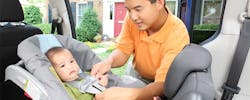Keeping Your Youngest Customers Safe: Offering Car Seat Installation and Inspection
Expecting parents face a lot of challenges as they prepare for the arrival of a new baby, but car seats — especially those for infants — can sometimes be an afterthought. New parents may know car seats are required by law but give the actual installation little attention. However, that can actually put the child at risk if the car seat isn’t installed properly.
In February, Grease Monkey of Idaho offered its first car seat safety check — and became the first oil and lube company in the state to offer this valuable service. It happened because last September Hilary Gregson, a team member and parent, found that a customer’s car seat was incorrectly installed.
She asked Tyson Daniels, the franchise owner of the Grease Monkey Idaho locations, if she should correct the problem.
“She asked me if she should offer to fix the issue with how the car seat was installed,” Daniels said. “I actually said not to do anything. At first, I didn’t want to touch it, as we could create a liability issue in case there was an accident.”
On the way home, Daniels realized he was wrong. In the future, he wanted techs to speak up, and he decided car seat installation was a service his locations should offer — at no cost to customers. Ensuring his youngest customers were safe became a priority for Daniels.
“It was on the way home that night I thought about it and realized this was a service we should provide to our clients,” he added. “I wasn’t sure what was involved, but I researched the issue. What I found out was surprising, to put it mildly.”
Daniels discovered that the vast majority of car seats are improperly installed. Many others are old and should be replaced. It was time not only to speak up, but also time to make sure his team knew how to perform proper installations.
“This isn’t something techs can learn by reading up on manuals,” Daniels noted, adding that he and his team were surprised to learn that upward of 84 percent of car seats are installed incorrectly and that 96 percent of parents assumed the car seats were properly installed.
He decided he needed to make sure his team knew better. Daniels sent five members of the Grease Monkey staff to a four-day training program in Butte, Montana.
To help ensure that car seat installation is performed correctly, the National Highway Traffic Safety Administration (NHTSA) developed the Child Passenger Safety Certification curriculum that is administered through Safe Kids Worldwide, which acts as the certifying body.
The National Child Passenger Safety Certification Training Program (CPS certification program) began in 1997, and to-date, more than 161,000 people have successfully completed the course. There are currently more than 41,000 CPS technicians — many of whom are trained health and safety professionals.
Today, the CPS certification program is offered in all 50 states, the District of Columbia and all U.S. territories. It is considered the gold standard of certification programs for proper car seat installation. Those taking the program, which is offered for $85, go through a rigorous three- to four-day course, which provides insight and instruction on car seat installation.
“We sent a number of techs to the CPS certification program with the NHTSA,” Daniels said. “This is a serious training program.”
Daniels added that car seat installation isn’t something that one tech can learn about and then pass on this knowledge. Anyone actually performing the car seat installations needs to attend CPS certification training.
“There is a reason the class is three to four days,” said Kerry Chausmer, certification director at Safe Kids Worldwide, which helps run the programs. “You have to work with all sorts of cars and car seats. This training is really crucial, because if someone tries to help a parent and doesn’t have this training, you can really put the child at risk.”
Daniels’ five Grease Monkey locations in Idaho have been offering car seat installation as a courtesy service for the past six months. He added that he sees this as something that can help build relationships with customers — yet because it involves child safety, it still needs to be handled accordingly. Many parents may not like to be lectured to or told that their car seat has been installed incorrectly, but, in most cases, a helpful acknowledgement of a problem can be most welcomed.
“It is a sensitive issue, and we understand you don’t want to lecture the customer,” Daniels said. “Instead, we want to inform the customers that this is a free service we offer and that our techs have been properly trained and certified to handle the installation.”
Currently, if technicians see a car seat during a service that isn’t installed properly, they can offer the recommendations to customers. In other cases, parents have learned Grease Monkey is offering car seat installation and inspection and have come in for help.
As noted, many of the people with the CPS certification are currently trained health and safety professionals, but Chausmer suggested that the auto service industry could certainly take advantage of offering this service.
“It is a great way to build that relationship with a parent or caregiver,” she said. “This is something people might not expect when they get their oil changed, but it could certainly bring them back again.”
Understanding the Importance of Proper Installation
Some people may question why car seat installation needs to be learned in a three- to four-day class — it’s because there is no universal standard for installation. Depending on the make and model of the vehicle, installation can be cumbersome.Being in a car seat is as important for a young rider as it is for a teen or adult to wear a safety belt. According to NHTSA, car crashes still remain a leading cause of death for children aged one to 13. For this reason it is recommended that parents and caregivers alike utilize car seats — as required by law nationwide — whenever a child is in a car.
“Research on the effectiveness of child restraints has found car seats to reduce fatal injury by 71 percent for infants younger than one year old, and by 54 percent for toddlers, one to four years old, in passenger cars,” said a NHTSA spokesperson via email to NOLN.
However, it is not just having the car seat that is crucial, but ensuring that it is properly installed.
“Misuse, or incorrect installation, can reduce the effectiveness of child restraints to various degrees depending on the criticality of misuse,” the NHTSA spokesperson added.
A study conducted by Safe Kids Worldwide in 2015 found that installation could be a problem with more than 80 percent of all car seats. This often occurs because parents believe they are just booster seats that are meant to keep a child from moving around in the backseat.
“We see that because car seats are typically used in the backseat that parents or caregivers don’t think that this is as important or as obvious as you might think,” Chausmer said. “But it provides a lot of benefit.”
Even with proper installation there can be other problems with car seats — and here too is where shops can provide value to customers via insight on this subject.
“We see many car seats aren’t even buckled in and, instead, are just placed in the backseat,” Daniels warned. “But, we also see many are expired or too big or small for the child.”
There are several factors in car seats that users need to understand — including the fact that upward of 16 percent of rear-facing infant car seats are installed with incorrect recline angles. This can affect an infant’s breathing and can be a problem in normal daily use.
The problem with forward-facing car seats that are intended for use with older children can often involve improper use of the top tether, which is meant to be a third point of contact and secures the top of the car seat to the vehicle. When properly installed, the car seat’s tether will keep a car seat from pitching forward in a crash. When improperly installed, the entire car seat can move forward — resulting in the child’s head possibly hitting the back of the front seat and potentially causing serious harm.
“I’m really glad that Hilary spoke up,” Daniels said. “And I’m proud that we now offer this service. This is a beneficial service that I’m glad we can offer, and it is something that can truly make a difference in our customers’ lives.”






